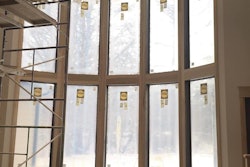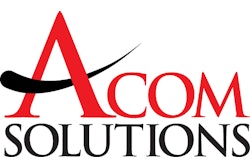E2open debuts solution to help manufacturers meet WEEE and RoHS requirements
Redwood City, CA — January 28, 2005 — Solution provider E2open this week debuted a new solution designed to help manufacturers comply with emerging environmental and hazardous materials rules and regulations.
Rapidly approaching deadlines for complying with such legislation as the European Union's (EU) Waste Electrical and Electronic Equipment (WEEE, deadline: August 2005) and Restriction of Hazardous Substances (RoHS, deadline: July 2006) require original equipment manufacturers (OEM) to understand the composition of their products and maintain access to technical records on the levels of controlled or hazardous materials that may be present prior to shipment of a finished good into any EU country.
Few companies today are able to adequately track material composition to address material composition declaration (MCD) requirements and are at risk of being fined and having their products impounded, resulting in decreased sales, lost market share and potentially negative press coverage.
In particular, companies must gather MCD data and manage non-compliant elements across 100 percent of their supply chain. With the new regulations, ignorance regarding the composition of any component or material in the product, regardless of where in the supply chain it originated — either with contract manufacturing service providers, component suppliers or distributors — will not excuse companies or be a defense to non-compliance.
E2open said its Material Composition Declaration (MCD) Solution provides a tool for collecting, maintaining and reporting data about the contents of electronics products. Specifically designed to manage the complexities surrounding new environmental compliance initiatives, the MCD Solution provides integrated data collection capabilities along with reporting and business intelligence tools to allow companies to manage the compliance of their products, E2open said.
Using this type of system can help limit liabilities and maintain uninterrupted access to key product markets while reducing the cost of compliance across the supply chain, according to the solution provider.
Industry analysts have begun to alert companies to the MCD challenge. Like Y2K preparations and Sarbanes-Oxley requirements, the broad business impact and pending deadlines for eco-compliance present challenges to both business and IT executives at each level of the supply chain.
"Any company doing business in the European Union (EU) has less than seven months to begin complying with the Waste Electrical and Electronic Equipment (WEEE) directive and less than eighteen months to come into compliance with the Restriction of Hazardous Substances (RoHS) directive," said Eric Karofsky in a recent AMR Research Alert. "Not meeting these two directives could cost companies millions. They must be taken seriously and be an executive-level priority."
To meet the needs of companies facing these new eco-regulations, E2open said its MCD Solution includes data collection and integration, application software, data warehousing, trading partner on-boarding, report generation, performance management, decision support and issue resolution tools for managing MCD compliance both internally and with partners. The solution manages data collection from all suppliers, encompassing all related part numbers, E2open said. It helps to manage and track material composition data, requests and change notices and includes MCD data collection forms based on the emerging RosettaNet Automated Enablement (RAE) program, along with capabilities for tracking business exceptions such as part non-conformance and supplier non-response.
The MCD Solution is delivered in a software-as-a-service model.
More articles about E2open.
More articles about WEEE and ROHS.
Redwood City, CA — January 28, 2005 — Solution provider E2open this week debuted a new solution designed to help manufacturers comply with emerging environmental and hazardous materials rules and regulations.
Rapidly approaching deadlines for complying with such legislation as the European Union's (EU) Waste Electrical and Electronic Equipment (WEEE, deadline: August 2005) and Restriction of Hazardous Substances (RoHS, deadline: July 2006) require original equipment manufacturers (OEM) to understand the composition of their products and maintain access to technical records on the levels of controlled or hazardous materials that may be present prior to shipment of a finished good into any EU country.
Few companies today are able to adequately track material composition to address material composition declaration (MCD) requirements and are at risk of being fined and having their products impounded, resulting in decreased sales, lost market share and potentially negative press coverage.
In particular, companies must gather MCD data and manage non-compliant elements across 100 percent of their supply chain. With the new regulations, ignorance regarding the composition of any component or material in the product, regardless of where in the supply chain it originated — either with contract manufacturing service providers, component suppliers or distributors — will not excuse companies or be a defense to non-compliance.
E2open said its Material Composition Declaration (MCD) Solution provides a tool for collecting, maintaining and reporting data about the contents of electronics products. Specifically designed to manage the complexities surrounding new environmental compliance initiatives, the MCD Solution provides integrated data collection capabilities along with reporting and business intelligence tools to allow companies to manage the compliance of their products, E2open said.
Using this type of system can help limit liabilities and maintain uninterrupted access to key product markets while reducing the cost of compliance across the supply chain, according to the solution provider.
Industry analysts have begun to alert companies to the MCD challenge. Like Y2K preparations and Sarbanes-Oxley requirements, the broad business impact and pending deadlines for eco-compliance present challenges to both business and IT executives at each level of the supply chain.
"Any company doing business in the European Union (EU) has less than seven months to begin complying with the Waste Electrical and Electronic Equipment (WEEE) directive and less than eighteen months to come into compliance with the Restriction of Hazardous Substances (RoHS) directive," said Eric Karofsky in a recent AMR Research Alert. "Not meeting these two directives could cost companies millions. They must be taken seriously and be an executive-level priority."
To meet the needs of companies facing these new eco-regulations, E2open said its MCD Solution includes data collection and integration, application software, data warehousing, trading partner on-boarding, report generation, performance management, decision support and issue resolution tools for managing MCD compliance both internally and with partners. The solution manages data collection from all suppliers, encompassing all related part numbers, E2open said. It helps to manage and track material composition data, requests and change notices and includes MCD data collection forms based on the emerging RosettaNet Automated Enablement (RAE) program, along with capabilities for tracking business exceptions such as part non-conformance and supplier non-response.
The MCD Solution is delivered in a software-as-a-service model.
More articles about E2open.
More articles about WEEE and ROHS.













